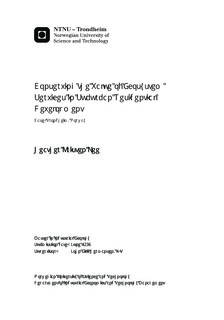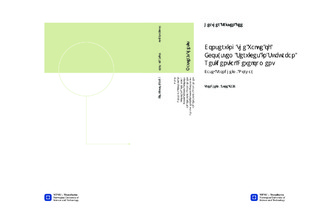| dc.contributor.advisor | Hermansen, John Eilif | nb_NO |
| dc.contributor.author | Lee, Heather Kristen | nb_NO |
| dc.date.accessioned | 2014-12-19T14:31:07Z | |
| dc.date.available | 2014-12-19T14:31:07Z | |
| dc.date.created | 2014-09-11 | nb_NO |
| dc.date.issued | 2014 | nb_NO |
| dc.identifier | 746134 | nb_NO |
| dc.identifier | ntnudaim:11695 | nb_NO |
| dc.identifier.uri | http://hdl.handle.net/11250/266896 | |
| dc.description.abstract | This study attempts to identify the values that Trondheim homebuyers place on having natural areas of forest and freshwater near their homes. These values are then examined through the cultural ecosystem services they attain from the natural spaces. By considering this information while examining the policies related to ecosystems and residential development in Trondheim, the study is able to propose new policies or regulations for the city s future planning initiatives. The majority of the study focuses on framework because it is necessary to integrate several concepts into the evaluation of policies since they are of concern to a variety of stakeholders. The framework goes through summarizing previous studies and initiatives that this study is based on. The most important of these is the Millennium Ecosystem Assessment (MEA), as this was used to determine and define which ecosystems and which ecosystem services would be investigated. The services addressed in the study are aesthetic, recreational, educational, and climate mitigation. Following this is a presentation of the valuation techniques commonly used for valuing non-tradable services and the results from some previous studies. The third part of the framework is a presentation of global goals and local goals, policies, and regulations. This framework was then used to guide interviews held with representatives from different industries. The results from the interviews are presented as well as the questions that guided the interviews. The final section combines the theoretical framework and information from interviews to assess the local goals and policies and make recommendations for how to integrate ecosystem service thinking into new policies. It is useful to know how the behavior of developers is regulated and what could give incentive to conserve natural habitats.The policy assessment found that Trondheim has set ambitious environmental goals that reflect the Sustainable Development Goals (SDGs) that should be adopted next year. However, Trondheim s regulations could give more specific requirements for developers and costs for ecosystem degradation. The study also found that the homebuyers of Trondheim do not demand that their residences be near natural areas only that the residence has a good view and sunlight. | nb_NO |
| dc.language | eng | nb_NO |
| dc.publisher | Institutt for industriell økonomi og teknologiledelse | nb_NO |
| dc.title | Conserving the Value of Ecosystem Services in Suburban Residential Development: Case: Trondheim, Norway | nb_NO |
| dc.type | Master thesis | nb_NO |
| dc.source.pagenumber | 85 | nb_NO |
| dc.contributor.department | Norges teknisk-naturvitenskapelige universitet, Fakultet for samfunnsvitenskap og teknologiledelse, Institutt for industriell økonomi og teknologiledelse | nb_NO |

